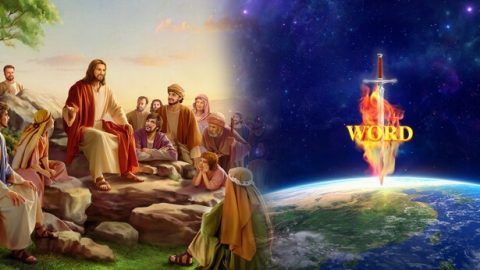Question 3: What is the difference between God’s words conveyed by prophets such as Isaiah, Ezekiel, and Daniel from the Age of Law, and the words expressed by God in the flesh?
Answer: Due to the difference between the essence of the incarnate God and the prophets, the incarnate God comes to do God’s work whereas the prophets only performed the duty of man. So the nature of their work is different. Let’s see how Almighty God says it. Almighty God says, “The prophets of the Old Testament spoke prophecies, and similarly, so could Jesus. Why is this so? The distinction here is based on the nature of the work. To discern this matter, you must not consider the nature of the flesh, nor should you consider the depth or superficiality of their words. Always you must first consider their work and the effects their work achieves in man. The prophecies spoken by the prophets at the time did not supply the life of man, and the inspirations received by those such as Isaiah and Daniel were merely prophecies, and not the way of life. If not for the direct revelation of Jehovah, none could have done that work, which is not possible for mortals. Jesus, too, spoke many words, but such words were the way of life from which man could find a path to practice. That is to say, first, He could supply the life of man, for Jesus is life; second, He could reverse the deviations of man; third, His work could succeed that of Jehovah in order to carry on the age; fourth, He could grasp the needs within man and understand what man lacks; fifth, He could usher in a new age and conclude the old. That is why He is called God and Christ; not only is He different from Isaiah but also from all other prophets” (The Word, Vol. 1. The Appearance and Work of God. The Difference Between the Ministry of God Incarnate and the Duty of Man). From the word of Almighty God, we realize that the incarnate God performs His own ministry and does the work within the management of God that represents the work of an era, and that the word He expresses is for all mankind. However, the prophets were those used by God to do the duty of man when He worked in the Age of Law. The prophets just conveyed the word of God through the inspiration of Jehovah God by stating some prophecies, giving some warnings to people or doing some sporadic work. If we can distinguish between the prophets’ duties and the incarnate God’s ministry, we can see the difference between the word of God conveyed by the prophets and the word expressed by the incarnate God. We all know that the prophets were people raised up in various periods of the Age of Law to convey God’s word. The main function of the prophets was to state the prophecies while conveying God’s requirements, commands, as well as God’s exhortations, reminders, warnings, and words of punishment to the Israelites or others. For example, when the evil deeds of the Ninevites came up before God, God sent Jonah to Nineveh to proclaim, “Yet forty days, and Nineveh shall be overthrown” (Jon 3:4). It can be seen that the prophets only conveyed the word of Jehovah in various periods. They did not do the work of any particular age. The words of God conveyed by the prophets were something like prophecies, exhortations, reminders, warnings and so on, not expressing all the truth for the salvation of mankind. As for the word of God incarnate, He comes to do a stage of work and speaks to all mankind in the identity of God, expressing His management plan for the salvation of mankind, His disposition, what He has and what He is, His requirements of man and the truth that mankind must possess. These words are the work that can open a new age and end an old age, and they are addressed to all mankind. They represent God’s work in this age and are all the truth that God’s chosen people have to experience and enter within this age. These words can supply life to man, make man repent, change man’s disposition, save and cleanse man and make man perfect.
So why is the truth expressed by the incarnate God able to save man and make man perfect? For the incarnate God has God’s essence. He is the Spirit of God in the flesh, that is, the essence of the life of God, what God has and what God is, the authority and wisdom of God, everything that God’s Spirit possesses is in the flesh. So the incarnate God is able to express all the truth to cleanse and save man and make man perfect. It is endless, inexhaustible, anywhere at any time. As we can see from the fact of God’s incarnation twice to do work, the incarnate God can express the truth anytime and anywhere to solve all difficulties and confusion of man in believing in God, doing his duty and entering life. He can rescue man completely from the domain of Satan. But the prophets were just ordinary people who did not have the essence of God. So they could not express the truth. They could only do their duties of conveying the word of God. The words of God conveyed by the prophets were limited. The scopes of what they said were also limited. They could only convey whatever words God inspired them, no more and no less. Without God’s inspiration, their functions of conveying God’s words would cease. Moreover, the prophets just did their duties to convey God’s words. They did not have the truth, nor could they express the truth. This is the difference between the words of God conveyed by the prophets and the words expressed by the incarnate God.
There is another difference between the words of God conveyed by the prophets and the words expressed by the incarnate God. Many of the words expressed by the incarnate God are human languages. The languages are common and easy to understand when they are heard by man. Most words of God conveyed by the prophets were divine languages that were difficult to understand when they were heard by man. Let’s look at two passages of the words of Almighty God.
Almighty God says, “When God had not yet become flesh, people did not understand much of what He said, because His words came out of complete divinity. The perspective and context of what He said was invisible and unreachable to mankind; it was expressed from a spiritual realm that people could not see. For people who lived in the flesh, they could not pass through the spiritual realm. But after God became flesh, He spoke to mankind from the perspective of humanity, and He came out of and surpassed the scope of the spiritual realm. He could express His divine disposition, will, and attitude through things humans could imagine, things they saw and encountered in their lives, and using methods that humans could accept, in a language they could understand, and with knowledge they could grasp, to allow mankind to understand and to know God, to comprehend His intention and His required standards within the scope of their capacity and to the degree that they were able. This was the method and principle of God’s work in humanity” (The Word, Vol. 2. On Knowing God. God’s Work, God’s Disposition, and God Himself III).
“This was the advantage of God becoming flesh: He could take advantage of mankind’s knowledge and use human language to speak to people, and to express His will. He explained or ‘translated’ to man His profound, divine language that people struggled to understand in human language, in a human way. This helped people understand His will and know what He wanted to do. He could also have conversations with people from the human perspective, using human language, and communicate with people in a way they understood. He could even speak and work using human language and knowledge so that people could feel God’s kindness and closeness, so that they could see His heart” (The Word, Vol. 2. On Knowing God. God’s Work, God’s Disposition, and God Himself III).
Almighty God’s word makes it very clear. All the words spoken by God before He is incarnated are divine language. After being incarnated, God can transcend the realm of the spiritual world and speak with man in human language from the perspective of humanity. Since the incarnate God can live with man, He personally experiences and witnesses the living of mankind. He comes to understand and master some knowledge, common sense, language or expressions from people by living in humanity. So the incarnate God can use human cognition or man’s personal experience to give examples and make parables, and speak more clearly, thoroughly, and precisely about God’s requirements of mankind, God’s will, essence, disposition, and what God has and what God is. Upon hearing these words, man can accurately understand God’s will, find the way to practice and enter, and at the same time, understand God’s disposition and what God has and what God is. For example, Peter said to Jesus, “Lord, how oft shall my brother sin against me, and I forgive him? till seven times?” Jesus said to him, “I say not to you, Until seven times: but, Until seventy times seven” (See Mat 18: 21-22). From the words of the Lord Jesus, we can understand that God wants man to learn to forgive others, to be able to forgive others without conditions, without limit on the number, and be able to do it in the spirit of understanding and tolerating others. At the same time, we also see the essence of God’s goodness in the words of the Lord Jesus. Other examples are the Lord Jesus’ sermon on the mount on the beatitudes, on anger, on oaths, on loving one’s enemy, on loving your neighbor as yourself, the Lord Jesus’ parable of the lost sheep, and so on, and they are all in human languages. Upon listening, we can accurately understand God’s will without seeking or exploring, and know God’s disposition from these words. This is an obvious feature of the words of the incarnate God. The prophets just conveyed God’s word or made prophecies from receiving God’s inspiration. These words were all divine languages. People could only understand them roughly but not entirely. This is the distinct difference between the prophets’ language in conveying God’s word and the word expressed by the incarnate God.
—The movie script of Waiting




